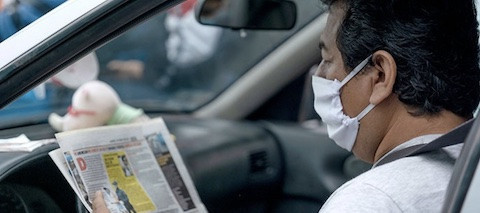
GCED Basic Search Form
Quick Search
현재 위치
뉴스

UNESCO and the Government of Namibia will host the World Press Freedom Day Global Conference in Windhoek from 29 April through 3 May, World Press Freedom Day. The laureate of the 2021 UNESCO/Guillermo Cano Press Freedom Prize will be honoured during the conference, on 2 May.
Professional journalists and other media stakeholders at the Conference will call for urgent measures to counter the threats that are weakening independent and local news media around the world, a crisis worsened by the COVID-19 pandemic. They will put forward solutions to bolster media viability, push for greater transparency from social media companies, and measures to improve the safety of journalists and support independent media. Participants are also expected to urge governments to invest in media and information literacy training to help people recognize, value, and defend fact-based journalism as an essential part of information as a public good.
Some 40 sessions will be held during the 5-day conference including three thematic discussions on issues currently affecting media viability, the transparency of online platforms, and ways to strengthen media and information literacy.
Hage Geingob, the President of Namibia, and UNESCO Director-General Audrey Azoulay will address the conference on 2 May, alongside senior African government officials and UN Secretary-General Antonio Guterres (through a video message).
Keynotes and interviews with over 250 world-renowned journalists, media and tech leaders, experts, policy makers, and activists will be held during the event which be an opportunity for registered participants to network, and interact with speakers, and access an offering of podcasts, films, and artistic contributions on a conference online platform.
Notable speakers will include:
- Joseph Stiglitz (USA), Nobel Memorial Prize in Economic Sciences
- Irene Khan, UN Special Rapporteur on the Promotion and Protection of the Right to Freedom of Opinion and Expression
- Agnès Callamard, Secretary General, Amnesty International
- Maria Ressa (Philippines), CEO of Rappler
- Swe Win, Editor in Chief of Myanmar Now, recognized media outlet for its collaborative and investigative reporting on human rights abuses.
- Julie Owono, Member of Facebook’s Oversight Board. Executive Director of Internet sans Frontiers
- Miranda Johnson, The Economist, Deputy Executive Editor
- Stephen Dunbar-Johnson (USA), President, International of The New York Times
- Sir Nicholas Clegg, Vice-President for Global Affairs and Communications at Facebook
Notable programme highlights will include:
- Six Regional Forums on specific, regional aspects of press freedom and ways to tackle current trends and challenges. The Forums build on the regional seminars that followed the UNESCO’s first African press freedom seminar in Windhoek in 1991.
- A one-on-one dialogue about information as a public good with Joseph Stiglitz, Nobel Memorial Prize in Economic Sciences and Miranda Johnson, Deputy Executive Editor of The Economist.
- 30 April: Presentation of key findings from UNESCO’s global study on online violence against women journalists, a trailblazing research project that assesses the scope and impact of the new frontline of media safety through big data analyses and an in-depth literature review.
The digital revolution has weakened business models of most independent media and damaged their viability. The loss in revenue in 2020 is estimated to total US$30 billion. Local news 'deserts' are becoming ever more common as media outlets close, merge, or downsize in many parts of the Global North and South, and political interest groups take control of struggling media outlets. Due to the COVID-19 disruption, two-thirds of staff and freelance journalists worldwide have also suffered pay cuts, lost revenue, job losses, cancelled commissions or worsening working conditions, according to a survey carried out by the International Federation of Journalists IFJ. A survey by the International Center for Journalists and the Tow Center at Columbia University found that over 40% of surveyed journalists reported losing more than half their income.
The COVID-19 pandemic has seen a steep rise in the in attacks on journalists and a weakening in regulations protecting freedom of expression. UNESCO’s forthcoming study on online violence against women journalists shows that 73% of the women journalists surveyed had experienced online violence relating to their work. Online violence, often in the form of coordinated misogynistic attacks, goes from hateful language to threats of sexual or physical violence. According to the International Press Institute, countries have reported more than 400 media freedom violations linked to the COVID-19 crisis, including restrictions on access to information and excessive regulations against alleged fake news, ostensibly meant to address COVID-19 related disinformation.
The role of journalists in producing and sharing factual information is essential to all members of society. Whether exposing corruption, alerting us to conflicts or debunking disinformation on COVID-19, the information they provide must be recognized as a public good.
This year’s celebration of World Press Freedom also marks the 30th anniversary of the Windhoek Declaration, developed by African journalists pressing for a free, independent, and pluralistic African press at a seminar organized by the UN and UNESCO in Windhoek in 1991. The declaration which triggered the proclamation of the 3rd May as World Press Freedom Day by the UN General Assembly. The Award Ceremony of the UNESCO/Guillermo Cano World Press Freedom Prize will take place on 2 May.
The Prize, unique in the UN system, honours a person, organization or institution that has made an outstanding contribution to the defence and, or promotion of press freedom anywhere in the world, especially in the face of danger.
- Related links
URL:
